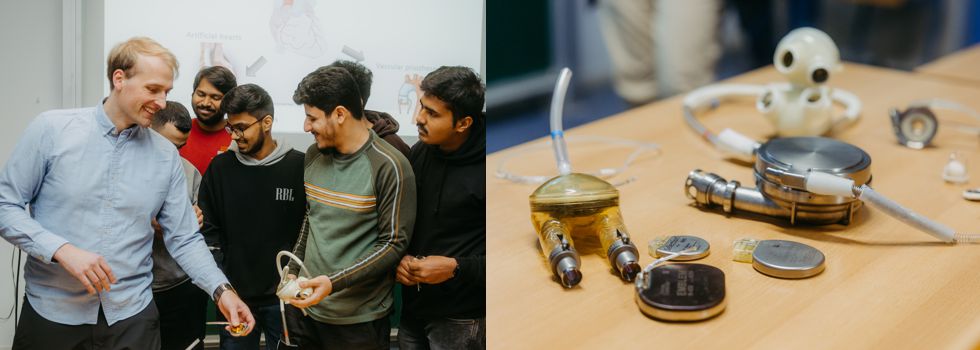Artifical heartbeats – technical gold standard in cardiac surgery
What to do when the heart weakens?
This question was answered by cardiac surgeon Dr. med. Max Wacker in his guest lecture on cardiac implants.
Photos: Jana Dünnhaupt
 Impression of Dr. med. Max Wacker's guest lecture (Bild 1 von 8) » Vorwärts
Impression of Dr. med. Max Wacker's guest lecture (Bild 1 von 8) » Vorwärts « ZurückImpression of Dr. med. Max Wacker's guest lecture (Bild 2 von 8) » Vorwärts
« ZurückImpression of Dr. med. Max Wacker's guest lecture (Bild 2 von 8) » Vorwärts « ZurückDifferent designs of mechanical heart valves (Bild 3 von 8) » Vorwärts
« ZurückDifferent designs of mechanical heart valves (Bild 3 von 8) » Vorwärts « ZurückDifferent designs of mechanical heart valves (Bild 4 von 8) » Vorwärts
« ZurückDifferent designs of mechanical heart valves (Bild 4 von 8) » Vorwärts « ZurückICDs with an electrode (Bild 5 von 8) » Vorwärts
« ZurückICDs with an electrode (Bild 5 von 8) » Vorwärts « ZurückICDs with an electrode (Bild 6 von 8) » Vorwärts
« ZurückICDs with an electrode (Bild 6 von 8) » Vorwärts « ZurückModern (front) and old (back) ventricular assist devices for full implantation (Bild 7 von 8) » Vorwärts
« ZurückModern (front) and old (back) ventricular assist devices for full implantation (Bild 7 von 8) » Vorwärts « Zurück(front) Modern total artificial heart, fully implantable and pneumatically driven / (back) Ventricular assist device for extracorporeal support, non implantable (Bild 8 von 8)
« Zurück(front) Modern total artificial heart, fully implantable and pneumatically driven / (back) Ventricular assist device for extracorporeal support, non implantable (Bild 8 von 8)
Guest Lecture on Cardiac Implants
In his guest lecture, cardiac surgeon Dr. med. Max Wacker gave interesting insights into cardiac procedures and diseases as well as the medical applications and technological developments of cardiac implants. Students of the Biomechanical Engineering master program were able to take a close look at various exhibits, from mechanical heart valves, pacemakers, defibrillators and cardiac support systems to an ultramodern total artificial heart.
Our heart, as a hollow muscle, is the engine of blood circulation requiring a rapid and coordinated excitation of the atria and ventricles and full functionality of the heart valves. Nevertheless, cardiovascular diseases are the number one widespread diseases in Germany and are the most common cause of death. Based on clinical symptoms and criteria, the indication for medication or surgery is made, which primarily aims at the prevention of acute or chronic heart failure.
In case that a heart valve does not open fully (stenosis) or does not close properly (insufficiency), heart valve surgery is performed. Besides the conventional technique that involves a heart-lung-machine, minimally invasive procedures for heart valve reconstruction or replacement using endovascular techniques can be performed. Dr. Wacker presented the technical advances in mechanical heart valves by showing different examples.
Furthermore, he introduced the students to pacemakers and defibrillators. Our heart’s conduction system consists of specialized muscle cells organized in nodes (sinoatrial node, atrioventricular node) and bundles that send and distribute electrical impulses all over the heart to create the heart beat. The purpose of a pacemaker is to artificially take over the function of this conduction system when it is not functioning properly. The implanted pacemaker device, in the size of a large pocket watch, sends electrical impulses via vein-guided electrodes to the heart muscle tissue, causing it to contract. An implantable cardioverter-defibrillator (ICD) is an implantable device that detects any life-threatening, abnormal heart’s rhythm, known as arrhythmia. If such a case occurs, the ICD quickly delivers an electrical shock to the heart (defibrillation), which returns the rhythm to normal.
Another innovative application is artificial hearts. They are increasingly in demand as a temporary alternative to donor hearts. For the affected patient, they are the last chance to improve and prolong life, when drugs and pacemakers can no longer compensate for the limited function of the heart while waiting for a transplant. Dr. med. Max Wacker explained the technical components of ventricular assist devices (VAD) consisting of an implanted blood pump and an external battery and controller. Research is currently focusing on systems that transmit electricity wirelessly into the body, further reducing the risk of infection.
Dr. med. Max Wacker is part of the team of the University Clinic for Cardiac and Thoracic Surgery Magdeburg that is led by clinic director Prof. Dr. med. Jens Wippermann. The clinic is known to have implanted the first total artificial heart by replacing the complete organ in Saxony Anhalt in 2019.
Thanks to this guest lecture given by Dr. med. Max Wacker, students acquired a good knowledge of the various cardiac procedures and equipment used as well as their background. They were particularly fascinated by the diversity of the innovative cardiac implants, which require sophisticated engineers in their future research and development.
Authors: Sai Nithin Nadikattu and Maria Herbster
